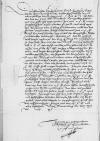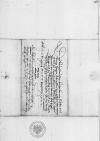Aus E(wer) F(urstlichen) D(urchlauch)t ⌊⌋, das den XVIII dits mondts zu ⌊Konigsberg⌋ gegeben und uns gestriges tags worden, / hab wir E(wer) F(urstlichen) D(urchlauch)t notige sorgfeldigheit ⌊diesen landen⌋ zu gutt, / und auch was den ⌊ersamen vom Elbing⌋ zuantworten / radts von uns fordert, / vorstanden, / solchs auch, / dieweil uns E(wer) F(urstlichen) D(urchlauch)t brieff hie nach fi(!)inden, / ins mittel den ⌊koniglichen rethen⌋ zubedencken vorbracht. / Befinden aber, das der mehrer teill dorzu gestimpt, / ⌊den vom Elbing⌋ die ausschiffung so freÿ solde sein, wie ⌊den von Dantzk⌋, / und sich beschwert, das E(wer) F(urstliche) D(urchlauch)t das tieffe widder alten gebrauch und recessen / ane zulos ⌊ko(nigliche)r m(aieste)t⌋, unsers allergnedigisten herrenn, / und dieses koniglichen raths mit wissen unnd willen / geschlossen, / anzeigende, das kortz zuvor E(wer) F(urstliche) D(urchlauch)t von der ⌊Mymel⌋ und andern ortern auszuschiffen getreidt und andere wahre het gestattet, / welchs wir, / wie es ⌊bei uns ÿm rate⌋ vorhandelt, vortrauter weiss E(wer) F(urstliche) D(urchlauch)t nicht habe mogen vorhalten. / Hieraus, was ⌊den vom Elbing⌋ widder zuschreiben sei, / hat E(wer) F(urstliche) D(urchlauch)t leichtlich zuermessen. / Es wirt auch derhalben der edel, ernvhest h(er) ⌊dantzker castellan⌋, / der sich zu E(wer) F(urstlichen) D(urchlauch)t zubegeben diese tage vorgenommen, / hirinne von der ⌊hern rethe⌋ wegen weitern bericht, / und sonst auch was wir uns mit ym E(wer) F(urstlichen) D(urchlauch)t zum besten trewhertziger meÿnung beredt, / mitbringen, / von dem / vil andere sachen, die aus der federn nicht wollen, E(wer) F(urstliche) D(urchlauch)t wirt vorstehen, / hirumb wir fast ym ende dieser ⌊tagefart⌋, mit geschefften beladen, / dis unser schreiben ins kortze gestelt, / freuntlich bittende, in angefangener gunst gen uns uffzunehmen, / hiemit wir uns E(wer) F(urstlichen) D(urchlauch)t mit vleis befelhenn.
 GStA PK, HBA, C1 No 680, 2 unnumbered
GStA PK, HBA, C1 No 680, 2 unnumbered  GStA PK, HBA, C1 No 680, 1 unnumbered
GStA PK, HBA, C1 No 680, 1 unnumbered 
